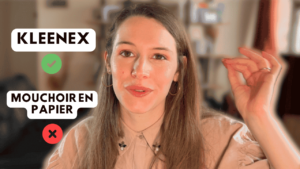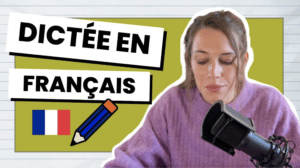Transcript of the video
Hello everyone.
Hello.
Welcome to this new video. As you can see, I'm not alone. I'm joined by a YouTube French star.
Star... Star... It's okay...
I'm sure you already know her. I'm with Nelly from the French with Nelly channel.
It's me, and I'm delighted to be here.
You may have seen last week's video we made together on Nelly's channel, where we looked at the differences between French from Belgium and French from France. Today, we're going to play a little game together.
Let's play. With pleasure.
I'm going to say some Belgian expressions and you can try to guess what they mean. And you too can try to guess what these expressions mean.
Don't worry, I'll help you if there are any expressions where you hesitate, I'll give you little examples.
I have a feeling I'm going to need your help because it's going to be complicated. I already know.
So... The first expression, it's a bit old-fashioned, but I heard it in an interview with Angèle and I think it's too beautiful. It's: Être bleu de quelqu'un.
Being blue for someone. I've never heard it, but I think it means "to be in love".
Exactly.
I thought of this because they say "to be a blue flower" means to have a lot of passionate feelings for someone.
Exactly.
Am I blue for you?
Yes, exactly. You gave a perfect example. I don't even need to give another example.
A point for me.
The second expression we use a lot, especially when we're teenagers, is: brushing the courses.
We have a similar expression, I think, which is "skipping school".
Exactly. Which means not coming to class to do something else. So brushing up on the lessons.
We say brush, for example, I can say, "I brushed the courses to go to the movies with my friends."
I brush my hair, but I don't brush my lessons. It's true that in France, it's brushing your hair, but...
It's also called brushing hair. I don't know where that comes from.
You'll tell me skipping school is a bit weird too.
Yeah, it doesn't make much sense really. So, for now, you're ready to move to Belgium!
I'm starting to pack.
This one, I think, is going to be more complicated: being on blockade.
So, blockade, I imagine there's a link with being blocked. But I don't know in what situation you can be blockaded. Being on strike?
No, precisely, because I've already heard French people use it to say that the high schools were blocked, that they were blockading in front of the high schools. But with us, it doesn't mean that at all. Let me give you an example.
"I'm on blockade this week because I'm taking my exams next week."
OK, so maybe that means you don't get out of the house to study?
That's about it. When you're at university or school in Belgium, there's always a period, more or less two weeks before the exams, when there are no more classes. And these weeks are dedicated to revising at home. That's really it. Just before the exams, you have about two weeks to study on your own at home. And in fact, we say "blocus" because we "bloque" and I don't know if we say that in France too, but in Belgium, it's "réviser". "Je bloque". It means "I'm revising".
No, I don't think we use the same thing. People will say to me, "I'm in revision week, I'm revising."
But I've already had a misunderstanding with a French friend where we said "Sorry, we can't go out this week because we're on blockade" and he said... "Well precisely! Precisely!"
You're on strike.
Yeah, so... That's funny.
So, next expression: bite down on your chew.
I have no idea.
It's difficult because I don't even think "chique" is used in France.
"Chique" is a word I don't know. "To bite is to grab something with your mouth. But I don't see the association here, no.
Okay, I'll give you an example. For example, if you don't like shots, when you go to the doctor, for example, to have your blood drawn. I'll say, "Bite down on your chew, it's over in 10 seconds."
Wouldn't that be the equivalent of: "Get over yourself, make an effort."
That's exactly right. That's exactly right. And in fact, in Belgium, depending on the town, a chique is used in a different way. For example, where I come from, a chique is a chewing-gum. We'll always say "chique" rather than chewing gum, but in the Liège region, it's a candy.
All right, then. So already, there are...
Differences across the country.
Differences. Again, in Liège, they'll use "bonbon" to mean "cake".
Oh yeah?
Once, when I was a child, my parents and I were on vacation in France, and we met some people from Liège. My mom made friends with a lady and said, "Let's go and buy some sweets. And my mom was so happy. And then she saw that they were a bit like dry cakes... Disappointment. Yes, she was disappointed!
But yes, "Mort sur ta chique" is indeed "Prends sur toi".
Ok.
Do Bob or be Bob.
How do you write Bob?
B. O. B. Like the hat.
Like the hat. To make Bob or to be Bob?
Yes.
It's not like "I am Sam".
Yes, that's exactly it!
Except that your name is Bob.
His name is Bob, he just has another name.
To explain, when we say "I'm Sam", it means that at a party, you're the one who doesn't drink, so you'll be responsible for the safety of others and for driving the car. So, if you're the Sam at a party, that means you don't drink alcohol.
And in Belgium, you're the Bob, so I'll say, "I'm having a Coke because I'm Bob tonight."
A bit in the same register, in the same lexical field... Faire un à-fond. And the verb is "affoner".
I've never heard that verb before. Isn't making an à-fond an affront?
No.
Isn't that "provoking"?
No, not at all.
I have no idea, then.
I'll give you a hint. It's the opposite of a bob or a sam.
Being drunk.
No, but it's in this... In fact, an à-fond is simply, in French, a "dry bottom".
Ok.
Drinking bottoms up means drinking your whole glass at once. Often, it's more with shots. In Belgium, we say "affonner" or "à-fond". It's part of the student vocabulary of partying.
I imagine that in Bru[X]elles, sorry, in Bru[ss]elles, at night, there are a lot of à-fonds.
So, here, I'm giving it to you completely out of context, so it's going to be a bit difficult. Then I'll give you the verb that goes with it.
Filth.
So, here in France, to do something dirty is to do something bad to someone.
It's doing something nasty behind someone's back.
Yes, that's it.
For example, what could we say?
A scam... from a friend.
We use it that way too, but we use it in a different context, in the context of food. I'll say, "I feel like eating some filth."
For us, filth also means dirt, anything dirty. Maybe it means eating something greasy, which isn't necessarily good for your health.
Exactly, it's eating something that isn't healthy. For example, I might say, "I feel like eating a piece of junk, so I'm going to eat a Snickers bar." That's junk food. Exactly, that's junk food. It's cute, you say, "Ah, I feel like a little dirt."
If I say, "It's in Houtsiplou." And sometimes people even say, "It's in Houtsiplou-les-bains-de-pieds."
It sounds like the name of a town in the countryside. Does that mean it's far away?
Yes, it's a backwater.
Can you say that? Yes, a backwater. A town where there's no one, in the middle of nothing.
I think that in reality, Houtsiplou, this town, it really exists, but it's become part of everyday language as an expression to say "it's really a place lost in the countryside."
I've never heard it before, it's funny. Sounds good.
Yes, that sounds good.
We're much more vulgar. We'll say either "a backwater" or "the asshole of the world"... very vulgarly.
Yes.
Houtsiplou is cuter.
Yes, it's pretty, we like it a lot.
Set the door against it.
or leave the door open. I don't know the French equivalent and I always have trouble making myself understood.
Leave the door open? Close the door?
No.
Discovered?
Not either, but almost. For me, if the door is ajar, there's a space. Here, there's really no space. It's really stuck, but the handle isn't...
Closed. No.
"Leave the door against, I didn't take my keys", for example. "Contre" is glued. Folded. Yes, exactly. Folded.
Tenth. You don't have all the fries in the same bag.
You don't have all the fries in the same bag... Is this when we say, "We're not going to put all the eggs in one basket?"
No, it's not. It's not like that at all. Let's say you're on the street and you see someone running in reverse. You might say, "He didn't get all the fries in the same bag, that one!"
OK, I've got it. It doesn't have lights on every floor.
Yes, or it's missing a box.
It's all the same. That he's not very smart.
Yes, either he's not very smart or he's a bit crazy.
He's a bit stupid.
This is great if you want to shine, say something funny.
In Belgium, yes. "Not all fries come in the same bag."
There you go, you did well. There are plenty where you could guess what it was.
I've increased my stock of expressions. I can't wait to go to Brussels.
We say Bru[SS]elles in Belgium, not BruXelles. A lot of French people pronounce it BruXelles, and that's normal because it's an X, so I can understand, but it's Bru[SS]elles. Thank you very much Nelly for doing this video with me. It was great to talk about all these Belgian and French expressions together. I'm posting Nelly's YouTube channel. Don't hesitate to check out her content, which is great for improving your French.
I hope so.
And I'll see you soon for another video.
See you soon. See you soon.







